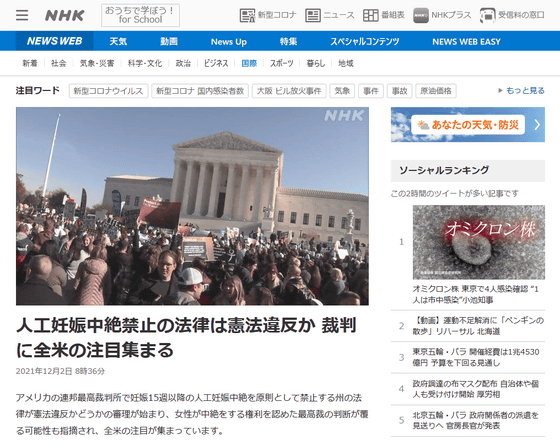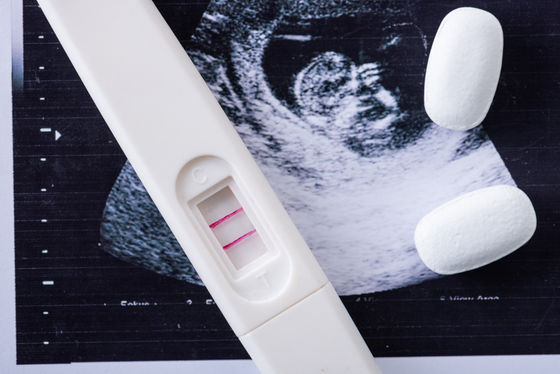What is the impact of 'prohibition of abortion' on pregnant women?

In the United States, a new law prohibiting abortion after the 6th week of pregnancy was enforced in Texas in September, and the current state law prohibiting abortion after the 15th week of pregnancy was started in December in Mississippi. There is a lot of discussion about the Abortion Prohibition Law. Against this backdrop, Scientific American, an American popular science magazine, reports on the 'effects of an abortion ban.'
Being Denied an Abortion Has Lasting Impacts on Health and Finances --Scientific American
On September 1, 2021, Texas enforced the 'Heartbeat Act,' which prohibits abortions after the sixth week of pregnancy. The sixth week of pregnancy was a time when the majority of women were unaware of their pregnancy, and the law recommended civil lawsuits against doctors involved in abortion other than those directly interested. Therefore, this case ignited the long-standing debate about 'the pros and cons of the abortion ban law' in the United States.
Texas bans 'abortion' after 6th week of pregnancy, could cause a storm of civil proceedings across the US-GIGAZINE

In this case, the Supreme Court ruled on December 10, 2021 that 'there is no injunction at this stage' , but around this time, the 15th week of pregnancy was enacted in 2018 in Mississippi. A hearing to discuss whether the state law 'Gestational Age Act ', which prohibits subsequent abortions, is unconstitutional has started on December 2.
Is the Abortion Prohibition Law Unconstitutional? Trial Attracts National Attention | NHK News

As mentioned above, the 'prohibition of abortion' is attracting the attention of the United States. Meanwhile, Scientific American reported, 'Does the ban on abortion have a positive or negative impact on society in general?'
A common opinion of abortion denials by Scientific American is that 'abortion causes physical and mental damage to the mother' and 'in recent years there have been legislation to protect equal economic opportunities. Therefore, abortion on the grounds of financial independence should not be allowed. ' There are several possible counterarguments to this, but when it comes to scientific verification, Scientific American says it is difficult. The main reason for this is that if you want to scientifically verify the effects of abortion, you will conduct a randomized controlled trial in which subjects are randomly divided into two groups and only one group is tested, which is said to have the least bias. This is because the experiment of 'randomly dividing pregnant women into two groups and performing abortion surgery on only one group' is virtually impossible from a humanitarian point of view.
Amid these restrictions, an abortion-related study that Scientific American described as 'pushing the limits of fairness' was announced by Professor Diana Greene Foster of the University of California, San Francisco, 'I went to an abortion clinic. The study compares 'women who were refused surgery because they had just passed the abortion period' and 'women who had surgery because they were just in time.' Professor Foster's survey, called the 'turn-away survey,' has in common that the two groups of pregnant women compared have 'wanted an abortion,' but they differ in 'whether or not they had an abortion.' , It is said that the impact of abortion on life can be estimated with high purity.

From 2008 to 2010, Professor Foster continued telephone interviews every six months for five years with nearly 1,000 pregnant women gathered at a total of 30 abortion clinics in 21 states. As a result, it was confirmed that the financial situation, education level, physical health, mental health, etc. of women who did not have an abortion operation deteriorated compared to those who had an abortion operation.
Six months after being refused surgery at the clinic, 45% of women who had an abortion were below the poverty line set by the U.S. government, but those who did not. 61% fell below the poverty line. In addition, the unemployment rate of women who underwent abortion surgery was 37%, and the percentage of women who received 'temporary assistance for poor families', which is a type of livelihood protection that pregnant women can apply for, was less than 8%, but they underwent abortion surgery. In the case of women who did not have an abortion rate, the unemployment rate reached 51%, the rate of receiving temporary assistance for poor families reached over 15%, and the rate of reporting that they were 'in trouble with living expenses' even one to five years later was high. It is said that it became. The rate of reporting worsening health was about 20% for women who had an abortion, compared to 27% for women who did not. In addition, there were no deaths during abortion surgery, but there were two deaths during childbirth, so Professor Foster points out that 'in addition to social disparities, there are also large physical disparities.' ..
Based on this turnaway survey, we are also conducting a study in which another researcher compares the 'credit scores' of similar subjects. The credit score is a numerical value calculated from the usage status of the credit card and the repayment history. increase. In a survey comparing credit scores mentioned above, women who were barely able to have an abortion had an average 78% increase in debt compared to before childbirth, with a number of negative public records such as bankruptcy and eviction. It was said that it had increased by 81%.
The problem with the turnaway survey is that the subjects were 'female who tried to undergo surgery at the last minute of the abortion period.' Although women usually go to abortion weeks before the abortion period and the results of turnaway surveys may not be generalized, Scientific American is a Mississippi abortion ban affirmative. He reports the view that 'clearly wrong' to the current situation where he advocates that 'the lifting of the ban on abortion surgery will hardly change the lives of the people of the state.'
Related Posts:
in Note, Posted by darkhorse_log






